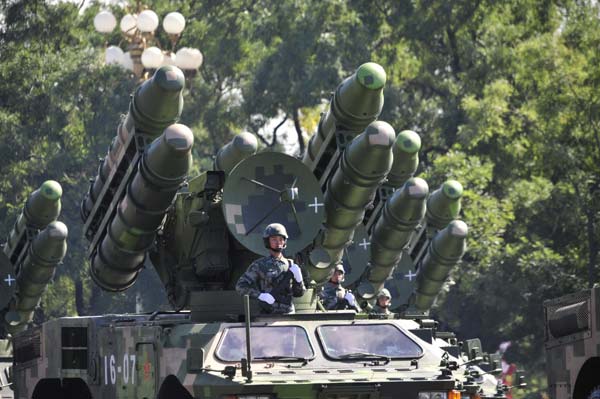China is considering reorganizing its seven military regions into five in a bid to respond more swiftly to a crisis, the Japanese daily Yomiuri Shimbun reported on Wednesday.
The news comes amid rising tensions over Beijing’s territorial claims in the region, with China and Japan squaring off over a chain of uninhabited islands in the East China Sea.
Each of the new military regions will create a joint operations command that controls the army, navy and air force as well as a strategic missile unit, the major daily said citing senior Chinese military officials and other sources.
The planned revamp would mark a shift from the current defence-oriented military that relies mainly on the army to one that ensures more mobile and integrated management of the army, navy, air force and strategic missile units, Yomiuri said.
“It is a proactive measure with eyes on counteracting the Japan-US alliance,” the daily quoted one of the officials as saying.
Tokyo and Beijing are locked in a simmering territorial row over Tokyo-controlled Senkaku Islands in the East China Sea which China also claims and calls the Diaoyus.
The United States, while insisting it does not take sides on sovereignty disputes, has said that the islands are under Tokyo’s management and so come under a security treaty in which it is required to defend officially pacifist Japan against attack.
Under the proposed military structure China aims to strengthen its attack capability to secure air and naval superiority in the South China Sea and the East China Sea, the daily said.
The newspaper also reported that Japan plans to deploy its first “Global Hawk” unmanned surveillance planes at an airbase in Misawa, on the northern tip of Japan’s main Honshu Island, adjacent to a US airbase where the same type of aircraft will be based later this year.
Japan’s defence ministry plans to deploy three Global Hawk drones between April 2015 and March 2016, Yomiuri said.
Misawa is located about 2,300 kilometers (1,430 miles) north of the Senkakus which Chinese coastguard ships have frequently approached, sometimes moving into territorial waters, since Tokyo nationalized some of the islands in September 2012.
Equipped with sophisticated sensors and radars, the Global Hawk drone is capable of flying more than 30 hours non-stop and detecting the movements of vessels, aircraft and missiles within a radius of 500 kilometers from an altitude of 18,000 meters.
It does not have attack capability.
The defence ministry and the US air force will jointly maintain the drones to ensure they operate effectively, the report said.
In addition, information collected by the Global Hawk will be shared and jointly analyzed, Yomiuri said.
China, which has been ramping up military spending over its past decade of strong economic growth, has also tussled with the Philippines and Vietnam over maritime territories.










